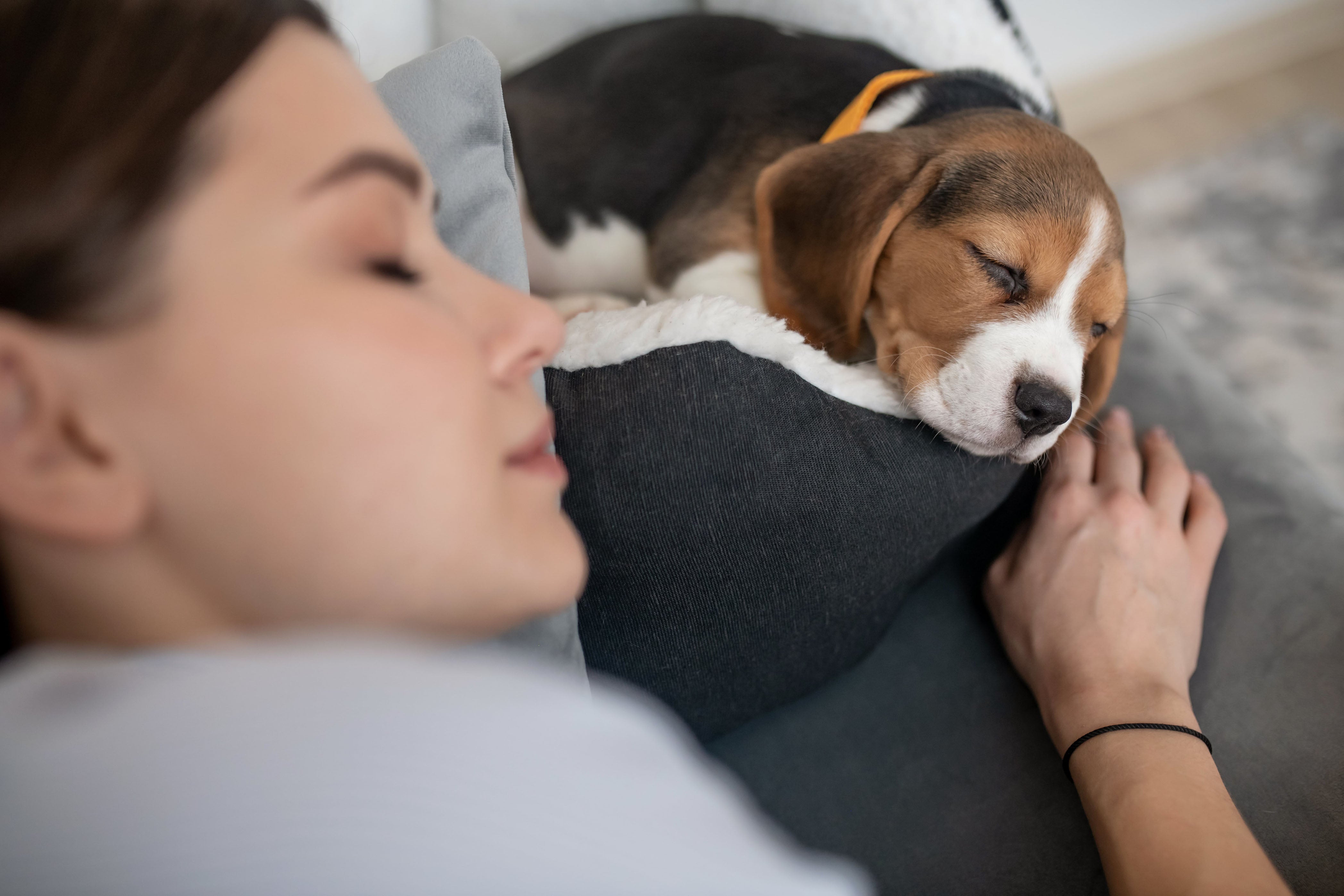
Nighttime Training For Your Pup
Nighttime Training For Your Pup
Sleeping through the night with a new puppy can be almost as difficult as it is with a newborn baby.
I want you to imagine two scenarios.
1) You jump into your warm bed, getting your dreams o… OUCH!
Listen.. Can you hear that? - Total silence.
Looking down, you see your furry angel. Already sound asleep in his bed.
Teaching Your Puppy To Sleep On His Bed

Puppy Training - What To Expect
When bringing your new puppy home, keep in mind - he was just separated from his mother.
During the day, playing or sleeping might mean your puppy got distracted and hasn’t yet realized that his mother isn’t there.
“Imagine, if you can, being a little baby, cared for and safe with your parents and siblings. Then imagine being abruptly removed from everything you know and plopped down in a new place, with new people, new sounds, smells, and sights. Sounds pretty scary, doesn’t it? That’s how a new puppy feels when you bring him home for the first time.”
- AKC
However, when nighttime arrives, there are no more distractions. It can get really dark and lonely for a pup.
It’s not really out of the ordinary if he starts to cry or seeks your attention in many different ways. At this point, you might be thinking of preparing another room, somewhere he can be alone in peace.
But, think of it this way, if you were in your puppy’s paws and a stranger came, took you away from your mother, and locked you up in a room, totally alone, at night…
How would you feel?
I, for one, would start screaming and crying for sure!
Your pooch needs support, not punishment! Putting him in your room will help with his separation anxiety and ultimately, with falling asleep.
New owners should expect to have disrupted sleep for a few nights or even weeks.
Anything else is unrealistic and sets them and their puppy up for failure.
Take this into consideration.
“We’re not going to lie to you – the first night (or even the first few nights) with a new puppy can be a little tricky. They’re used to sleeping with their siblings and mum, so not having them there is a really big change and can be upsetting at first.”
- PDSA (READ MORE)
Puppy Training - Preparing Your Puppy For Bedtime

Puppy first-night checklist
- The dog bed should be safe ( with nothing that can be chewed or swallowed easily )
- Have something soft, warm, and easy to get in and out of
- Put the bed in a quiet part of the room where the pup won't be disturbed – make a rule that no one disturbs the puppy when he’s sleeping
- Something waterproof underneath the bed (a cut open bin liner and newspaper will do the job) just in case of accidents but you should be looking over him to ensure your puppy doesn’t get the chance to make a mistake!
- Last but not least - Toys and Treats
Just like humans, puppies sleep better when they are relaxed and safe – knowing that we are the ones providing that for our new companion, means we can also sleep better!
Benefits of a dog bed
- Cushioning
- Helps with separation anxiety
- Keeps your doggo warm and relaxed
- Privacy & personal space that every dog needs
Ensure that the puppy gets out to the loo just before bedtime.

Puppy Training - Getting Your Puppy To Sleep
There are a few reasons why your puppy isn’t sleeping peacefully:
- He isn't used to sleeping without their litter mates and mother. This can cause isolation distress
- He can feel uncertain about his new surroundings. Everything smells and looks different, and he may hear sounds he's never heard before. This change may be exciting for him.
- Young puppies have small bladders. Most of them can't hold it throughout an entire night, usually, pups don't want to soil where they sleep, they should start crying if they feel the urge to go
It's all about your puppy's adjustment period, comfort, and biology.
In the beginning, when teaching your puppy how to sleep through the entire night - crates tend to work well since you aren’t really present outside of your dreams.
Keep in mind - you won’t have to use the crate his whole life if you don’t want to, just until your pup starts understanding the big picture and adjusts to the new situation.
What can also help you in crate training and getting him relaxed is a crate cover - helps with long days when the sun rises early and sets late.
The most important, life-changing, and mind-blowing piece of advice is this, get ready:
! Burn Some Puppy Energy Before Night Time !
I can’t stress this enough - you have to be active with your pup throughout the day - especially before you go to bed.
The more energy he loses during the day, the better he’ll sleep!
* Pro Tip - Take advantage of the commercial breaks during your evening television shows to practice some basic training points with your puppy. Not only does this work their brains and take the edge off their shoulders, but it builds a strong relationship with your puppy and promotes a strong training foundation.

Middle of The Night Potty Breaks
Night potty breaks are a little different from the ones during the day time.
During the day, you can play with your puppy and watch over him as nature calls. If you do that at night, you’ll create problems, he will start waking you up just to have a little play session!
Overnight potty trips focus on business ONLY. Take him directly to his potty area and give him a couple of minutes to go. When he goes, calmly tell him he’s good, take him back inside, put him in his crate, and go back to bed. - be calm and relaxed.
Don’t give him a reason to start playing around!
Bonus - First Puppy Feeding
- Start with having your puppy sit and wait for his food.
- Hold your puppy and set his food about two feet away.
- As soon as he calms down, say the words “OK” and release him.
Adult Dog Bedtime Training
We all know that sometimes things don’t go as planned, so we end up with full-grown toddlers having melt-downs before bed.
Over time - it stops being as cute as it was when they were cute, little puppies!
Naturally, training your adult dog is a little different than training a puppy. Having bedtime problems with your adult dog is a sign of untrained behavior..
Bear with me.. If you start training from an early age and with proper techniques - your pup will grow up into an obedient young dog.
But what happens if you miss that opportunity?
First, don’t be hard on yourself. We all have life going on.
Second, it’s never too late for your pooch to learn new things!
Third, forget about the past, get up and take matters into your own hands!
Time to train your pup!

STEP 1: Choose days for training when you're a bit more flexible
STEP 2: Buy a bed that suits your dog
STEP 3: Place the bed next to your bed
STEP 4: Teach them what “settle down” means
STEP 5: Using yummy treats, give your dog the “settle down” command, reward him and get yourself to bed
* Bonus - How to Teach the Command “Settle Down”
“Settle down” is a brother to “Down”. Once your dog learns the “Down” command, “Settle down” is an easy addition. Put that delicious treat in your hand, lead your pup to his dog bed and say “Settle down”. If your dog needs help with getting into the down position, help him by holding the treat between your fingers and place it slightly in front of and between his front legs.
When he lays down to get a better view of the treat, say “good settle down!” or “good boy!” and reward him with a treat.
* Pro Tip: Throughout the day, if you see your puppy resting and relaxing in his bed, whisper “Good Settle down” so that he begins to understand that “Settle down” means “Relax”.
With positive reinforcement and repetition, your dog will learn this command in no time!
HELP! My Dog Keeps Leaving His Bed
If your dog, for any reason, decides to leave his bed, take him back. You can offer him a treat for going back to bed but only do so once.
If he does it again again, no treat. If you continue to treat him, he’ll continue to wake you for that midnight snack you got him used to.
If he goes potty in the middle of the night, a treat is a good idea once he”s back in bed.
Dogs over a year old should make it through the night without going potty.
“If you’ve raised your dog since she was a young puppy, and she’s been progressing with recommended house-training methods, your 1-year-old should be able to hold her bladder eight to 10 hours”.
- dailypuppy (READ MORE)

How to Get Your Dog Used To a New Bed
Expectations of bringing a new dog bed home sometimes don’t match the reality.
Your dog may love his bed right away, on the other hand, he may need your guidance and encouragement.
For example, if he never had a bed before, he might not understand the idea right away. Here are some tips on introducing your doggo to the new bed:
- Try making the new bed smell like you
- Move the bed to a familiar location
- Make it a happy place using toys and treats
- Remove the old bed
- Give him some time
Getting your dog to enjoy their dog bed doesn’t have to be stressful and can actually be a lot of fun if you make it that way!
To get him used to his new bed, you will need a few things:
- Treats
- Toys
- Blankets
- A sheet
- Quiet Time and patience
Why Is Having a Dog Bed so Important

Our four-legged friends Instinctively seek out warm, safe spots to call their own. In the wild, dogs would never sleep on the wet, cold ground if they could help it.
Instead, they would gather leaves for isolation from the cold.
If your dog doesn’t have a dog bed at home, he may collect blankets or laundry to create their own cozy spot. Or he’ll maybe make his claim of the corner on the couch or your bed!
If you have a “no dog on furniture” rule in your home, a dog bed will give your dog the comfy nest he needs! Even if your dog is allowed up, you should get him a bed regardless.
Just like us, our pooches need their privacy from time to time - their own safe space.
* Bonus - Should I Let My Dog Sleep in My Bed?
There is a debate about whether or not sleeping with your dog is the best practice. Some studies show that it may result in a bad night’s sleep.
However, there are many studies that show the benefits of letting your dog sleep in the bed with you. For example, sleeping with your pooch has many mental benefits such as the feeling of safety and comfort.
People suffering from PTSD found that sleeping with their pets helped with having nightmares.
There are also physical benefits. Sleeping with your dog releases oxytocin in the brain. This is the chemical that’s released when a person falls in love, or when they are around their baby.
The chemical promotes theta brainwaves which are associated with REM sleep.
This means it’s likely that you’re sleeping deeper when sleeping with your pet. The chemical also mitigates anxiety and stress, which can help you sleep better.
Either way, your dog should always have his own private space!
Conclusion

It’s important to remember that your dog completely relies on you and your guidance. Make sure he gets the proper training - an obedient dog is a happy dog!
The research study concluded that even though society may not currently regard co-sleeping in the best light, because of the many benefits, there is no need for unnecessary concern.
I think those of us who share our beds and bedrooms with our dogs already know that any inconvenience is completely worth the nighttime of furry hugs.
Take one step at a time, train your dog first, enjoy his night hugs later!






